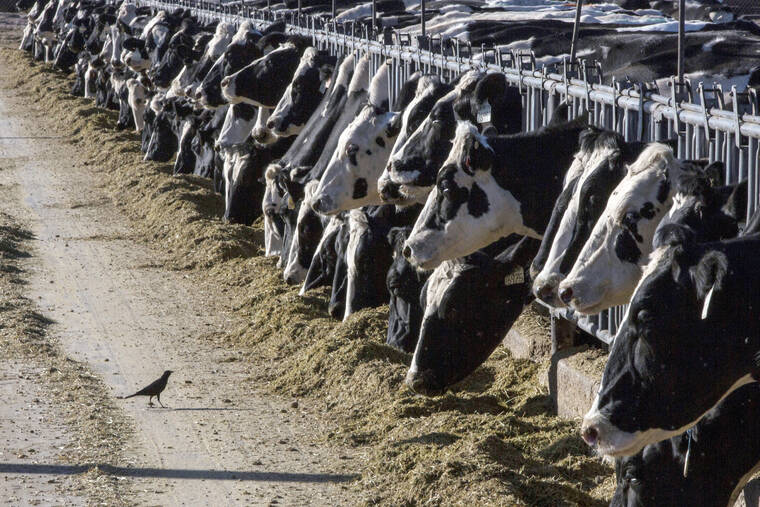Hawaii restricting cattle from areas with avian flu cases

ASSOCIATED PRESS
Dairy cattle feed at a farm, in March 2017, near Vado, N.M. The Hawaii Department of Agriculture said today it is restricting the transport of cattle from areas where highly pathogenic avian influenza — or H5N1 bird flu virus — has been detected.
The Hawaii Department of Agriculture said Friday that it is restricting the transport of cattle from areas where highly pathogenic avian influenza — or H5N1 bird flu virus — has been detected.
The bird flu has so far been detected in dairy cattle in six states Opens in a new tab — Texas, Kansas, New Mexico, Idaho, Ohio and Michigan.
The restriction went into effect today and will be placed on any future areas where infected cattle are found.
To date, no infected cattle have been detected in Hawaii.
“The Animal Disease Control Branch has been closely monitoring this situation and is establishing these restrictions to help protect Hawaii’s livestock,” said Sharon Hurd, chairperson of the Hawaii Board of Agriculture in a news release. “To date, HPAI has not been detected in birds, poultry, livestock or other animal species in Hawaii.”
The U.S. Centers for Disease Control and Prevention has issued an alert Opens in a new tab to inform state health departments and the public of the first confirmed cow-to-human infection of the bird flu in a farm worker in Texas.
Don't miss out on what's happening!
Stay in touch with breaking news, as it happens, conveniently in your email inbox. It's FREE!
The worker had been in contact with cows at a dairy farm in Texas presumed to be infected, according to reports, and suffered from conjunctivitis, but no other symptoms.
The H5N1 viruses are currently circulating among wild birds in the U.S., with associated outbreaks among poultry and backyard flocks and sporadic infections in various mammals, according to the CDC.
The current risk these viruses pose to the public, however, remains low, the CDC said.
HDOA already restricts the import of poultry and birds originating from areas with significant avian influenza outbreaks to Hawaii.
For imported cattle, HDOA already requires certificates of inspection from an accredited veterinarian but is now requiring them to also include a statement that all animals have been inspected and do not originate from “premises with a confirmed detection of HPAI in cattle” or under investigation with a suspect herd.
Additionally, eligible cattle from unaffected areas of states where the influenza has been detected must be inspected and found free of signs of infection within 72 hours of shipment.
Additional import requirements may be instituted on short notice, HDOA said.
Anyone with questions can contact HDOA at HDOA.LDC@hawaii.gov.




